 Scene reports
Scene reports
ATM is the Philadelphia collective breaking club music boundaries
This gang sandpaper across preconceptions of what’s acceptable to play in the club
SCRAAATCH’s live sound design plays with the notion of the outside the most obviously tonight. The duo spend time toying with the recognizable and the triggering. Splicing and reclaiming, employing Arca-esque symphonies of industrial sounds and beats often implied by the timing and layering of dictation in vocal samples, SCRAAATCH show themselves to be capable of dissecting the inner workings of dance music both structurally and ideologically.
As the night pushes on, it’s clear that there’s a sense of familiarity between dancers in the room, an unspoken culture of how to move and interact; and it seems as though the relationships on the floor have been brewing long before Mixmag arrives. At one point, a dancer distinguishes themselves from the crowd, taking front and center. A full-on, unofficial ballroom session breaks out. The dancer leaps and performs the iconic death drop; everyone cheers, then fills in the space as the dancer meshes back into the mass. There are several moments like this, where one or two of the crowd feel the music, have a personal moment with it, their dancefloor family around in full support.
Indeed, ATM is driven by a critical discourse with the collective’s surroundings and the members’ support for one another. Dj Haram’s moniker speaks to the complex context of her second-generation Muslim and queer identity, which is effectively haram (an act that’s forbidden in Islam). SCRAAATCH see their own project as a way to excavate the existential constructions of the spaces they reside in, whether they be online or off. And Marcelline describes her process as slipping “between hyper visibility and obscurity when performing in public, constantly mobile with a sense of not belonging anywhere, to anyone but to myself and not fully identifying with anything. Sound is used as an immediate way to communicate those realities at the same time.” ATM at a glance feels like a think tank, a meditation room, a group therapy session, a turn-up, a platform from which brave new music is fired.
Marcelline closes out the session: she triggers samples, manipulates entire songs in a raw, material way that distorts their content and context for a singular narrative that’s reflective of her own social statements and critiques. When she finishes, it's time for us to leave the periphery and return downtown.

The collective have high hopes, plans drawn up in abstract but fully intended to be filled and fulfilled over time. Marcelline denotes a range of potential directions for the group as being “a fully mobile entity both in physical space and online with rolling programming of varied conceptual parameters (sound based healing retreats, radio shows, club nights, youth workshops, etc) set to happen anywhere at any given moment.” lawd knows’ vision for ATM is similarly communal when he says: “You know Fela [Kuti]’s old venue, The Shrine? Where it was a living space, performance space and sovereign protectorate and shows would go on regularly all week? That.”
The cozy incubator model that ATM has in place is a far cry from large festivals like Ultra, Time Warp and so on, and the dynamic is altogether different because of it. The idea of emergent visibility is a tantamount theme for the collective as they work through limitations, dreaming in large-scale scope out of necessity. “We want to remain consistent. We think a lot about sustainability and it’s really important that we can sustain ATM,” they write collectively via email. “We want to continue to be a platform for fellow fugitives. We’d also like to pass ATM on in Philadelphia so that it continues later down the road when maybe we’re in different places (years from now hopefully).”


